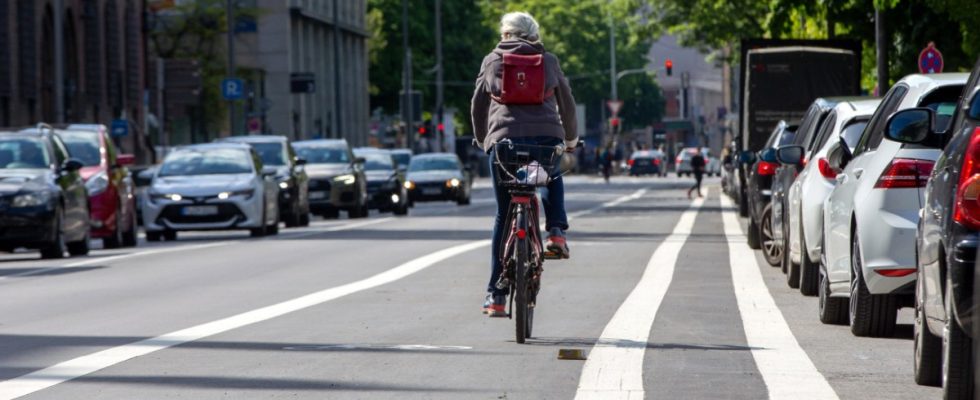Faster, easier, cheaper – this is how the city wants to build its new cycle paths in the future. This also means that there can and should be compromises on the highest standards originally set in the cycling decision. With a corresponding motion in the city council, which was also passed immediately in the general assembly, the coalition of the Greens/Pink List and SPD/Volt is readjusting its cycling policy. “We have to become faster and more efficient,” said SPD parliamentary group leader Anne Hübner.
In 2019, the city council adopted two referendums with a large majority that advocated a safe and comprehensive cycle path network in Munich, including the Old Town Ring. Implementation is therefore a task for the municipality, although progress is very slow. Four years later, the initiators of the cycling decision reported that the city had completed two sections and started two. She had planned 65 new cycle paths.
The SPD parliamentary group leader can understand the frustration of many cyclists. “A lot of things take far too long. It’s also logical if you completely dig up a street from left to right in order to then enable the wheel decision to be implemented exactly,” said the chairwoman of the SPD parliamentary group. Her group wants to move away from this, and Mayor Dieter Reiter (SPD) also criticized the high costs for short sections.
In the city council, the Greens largely left it to the SPD to explain the new strategy. Like her SPD colleague Hübner, parliamentary group spokeswoman Mona Fuchs referred to the difficult budget situation. The cycling decision should be implemented by 2025, said Hübner. “If we now look at what will actually be implemented by then, we have to say that we have a significant delay problem with our very comprehensive and expensive planning.”
The SPD parliamentary group leader is sure that most cyclists will agree. “The 160,000 signatories didn’t look at the small print in the cycling decision; they voted to ensure that cycling quickly becomes safer where it is unsafe.” And Hübner made another promise. Public participation in such transport projects should become better and more transparent, she explained. Citizens should know exactly when they would just be informed and when they could actually make a difference.
With its realignment in the construction of cycle paths, the coalition is also responding to the criticism of the planned new cycle path on Elisenstrasse. The 500 meter long section from Lenbachplatz and to Dachauer Straße should cost up to 13.8 million euros. After construction, it would have met the highest standards and, as part of the planned cycle highway to Fürstenfeldbruck, should have served as a model for other projects. The Greens called the section a “crystallization point” of the transport transition. There was strong criticism from the opposition about the high costs, especially since a simple, wide cycle path had already been marked out during the pandemic.
According to the coalition’s wishes, these plans should now be discussed again. It’s not a correction, but rather a “clarification,” said Hübner in the city council. The Greens pointed out that the high costs would arise primarily because of the necessary renovation of Lenbachplatz, where pedestrians should be able to cross the Old Town Ring easily and safely in the future. We are talking about “one of the largest inner-city intersections,” said parliamentary group leader Fuchs.
The CSU and FDP see their criticism of what they see as excessive cycle path construction confirmed. “The green-red coalition is currently reinventing the wheel,” said CSU city councilor Veronika Mirlach. If “a learning effect” occurs, that would be “a success for us”. The CSU does not want to fundamentally close itself to new cycle paths, but also does not always want to immediately accept a “radical” solution. On Lindwurmstrasse, for example, it was also clear to her group that something had to happen there for cyclists.
The FDP also viewed a rethinking of the “prestige project” on Elisenstrasse as progress. The crystallization project of the transport transition has melted “like butter in the sun,” said city councilor Fritz Roth. If there is now a “small U-turn” in the coalition and a sense of proportion replaces the mantra of maximum width, then “thank you very much”.

